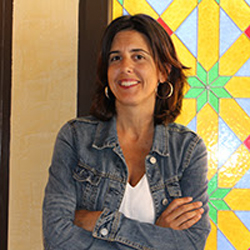Elena Lázaro Real
4. Kaleidoscope
The role of professional networks in the Spanish science communication system

Elena Lázaro Real, president of the AEC2 and coordinator of the Scientific Culture and Innovation Unit (UCCi) at the University of Cordoba
It is hard to find new arguments to bolster the need and urgency of ensuring adequate and effective knowledge dissemination. At this point in the century, when we have managed to decipher almost the entire human genome, find the Higgs boson and develop a vaccine for a new virus in just nine months; in these times, when much of humanity carries a computer in their pocket enabling real-time access not just to any information or service, but also to any lie, no matter how huge or camouflaged it might seem; in this decade, when the climate emergency demands a real political commitment for the planet’s very survival... Is there truly anyone left who doubts the importance and urgency of ensuring real and inclusive access to knowledge?
Still, the fact that it is obvious does not make it any less imperative: the world needs an informed citizenry to take decisions from a critical position based on proven knowledge of reality.
My aim in this article is thus not to provide new arguments in favour of effective and professional science communication able to fulfil the corresponding role in democratic systems. Instead, I intend to focus on one of the organizations that has been working to do just that, uninterruptedly, for the longest time: the Spanish Scientific Communication Association (AEC2).
Founded in 1971 by a group of science journalists, the AEC2 has been working for half a century to professionalize the dissemination of knowledge. It is thus not dedicated to dissemination itself, but to the people who practice it. This nuance matters. Whilst the AEC2 is an important player in the Spanish knowledge dissemination system, it is in no way a direct knowledge dissemination agent itself. Its role is to weave the network that sustains the system, fostering meetings and conversation between the various actors in the outreach ecosystem.
The world is too complex, and science journalism and communication too necessary, to leave professional practice in this field to hunches and good intentions. The professionalization of the social communication of science, threatened by the efficiency and speed with which lies are spread, has an historic opportunity to advance, based on the evidence provided by the work of the people researching it. We simply need to open the necessary channels to make the transfer of this knowledge real.
The AEC2 provides a forum for people involved in science communication in various fields to share ideas, contacts and conversation. Of course, its members include numerous science journalists, including both permanent staff members at various media companies and freelancers. This was the profile the organization was initially established with, as witnessed in its name for the first few decades: the Spanish Association of Science Journalism. These are the people who engage in the specific task of reporting on the latest science news, but also the ones who use the scientific perspective to explain the political, social or cultural reality. The AEC2’s members also include a number of professionals who engage in science communication at university and research centre press offices and scientific culture units, as well as the people engaged in research and science outreach at those same institutions. Science museums and science communication companies round out the habitat of AEC2 members who regularly work in the field of science communication. Alongside all these profiles, the Association has also incorporated an especially unique and relevant profile in recent decades, namely, academics who research and try to provide evidence on science reporting and outreach processes. It is the knowledge they generate that makes us confident that the profession will be up to the challenges posed by the disinformation society.
The world is too complex, and science journalism and communication too necessary, to leave professional practice in this field to hunches and good intentions. The professionalization of the social communication of science, threatened by the efficiency and speed with which lies are spread, has an historic opportunity to advance, based on the evidence provided by the work of the people researching it. We simply need to open the necessary channels to make the transfer of this knowledge real. And this is where networks such as the AEC2 play a fundamental role, putting them in touch with each other and making it easier to combine the knowledge of some with the experience of others to build a space where the information and knowledge dissemination that 21st-century democratic societies require can easily thrive.
The AEC2 has been working on this for half a century. We cannot stop now.
